The Intel Comet Lake Core i9-10900K, i7-10700K, i5-10600K CPU Review: Skylake We Go Again
by Dr. Ian Cutress on May 20, 2020 9:00 AM EST- Posted in
- CPUs
- Intel
- Skylake
- 14nm
- Z490
- 10th Gen Core
- Comet Lake
CPU Performance: Web and Legacy Tests
While more the focus of low-end and small form factor systems, web-based benchmarks are notoriously difficult to standardize. Modern web browsers are frequently updated, with no recourse to disable those updates, and as such there is difficulty in keeping a common platform. The fast paced nature of browser development means that version numbers (and performance) can change from week to week. Despite this, web tests are often a good measure of user experience: a lot of what most office work is today revolves around web applications, particularly email and office apps, but also interfaces and development environments. Our web tests include some of the industry standard tests, as well as a few popular but older tests.
We have also included our legacy benchmarks in this section, representing a stack of older code for popular benchmarks.
All of our benchmark results can also be found in our benchmark engine, Bench.
Speedometer 2: JavaScript Frameworks
Our newest web test is Speedometer 2, which is a accrued test over a series of javascript frameworks to do three simple things: built a list, enable each item in the list, and remove the list. All the frameworks implement the same visual cues, but obviously apply them from different coding angles.
Our test goes through the list of frameworks, and produces a final score indicative of ‘rpm’, one of the benchmarks internal metrics. We report this final score.
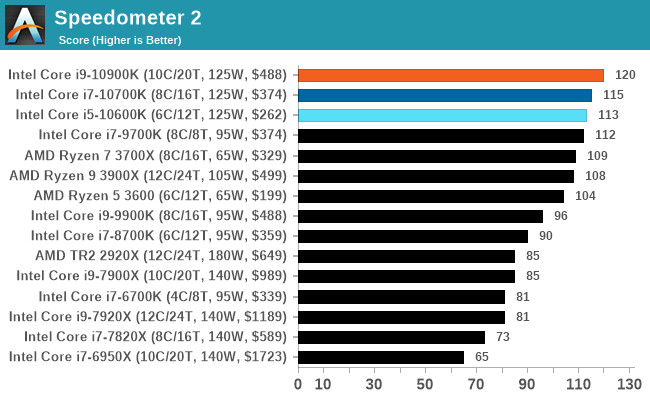
Google Octane 2.0: Core Web Compute
A popular web test for several years, but now no longer being updated, is Octane, developed by Google. Version 2.0 of the test performs the best part of two-dozen compute related tasks, such as regular expressions, cryptography, ray tracing, emulation, and Navier-Stokes physics calculations.
The test gives each sub-test a score and produces a geometric mean of the set as a final result. We run the full benchmark four times, and average the final results.
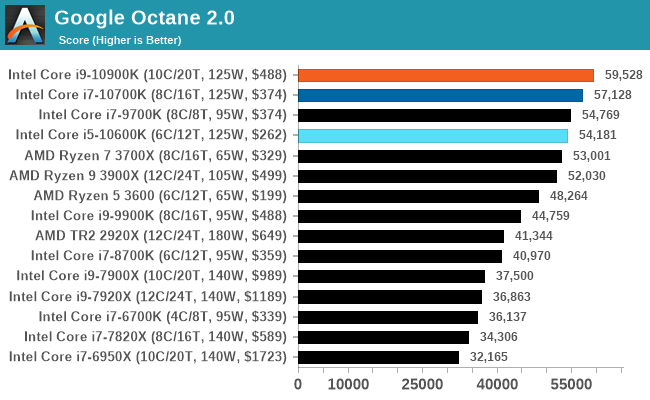
Mozilla Kraken 1.1: Core Web Compute
Even older than Octane is Kraken, this time developed by Mozilla. This is an older test that does similar computational mechanics, such as audio processing or image filtering. Kraken seems to produce a highly variable result depending on the browser version, as it is a test that is keenly optimized for.
The main benchmark runs through each of the sub-tests ten times and produces an average time to completion for each loop, given in milliseconds. We run the full benchmark four times and take an average of the time taken.
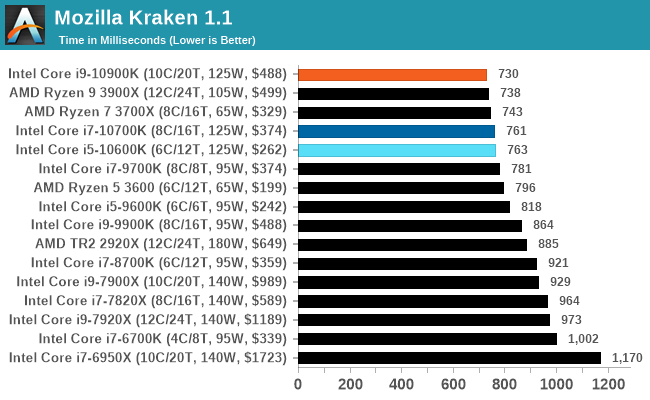
3DPM v1: Naïve Code Variant of 3DPM v2.1
The first legacy test in the suite is the first version of our 3DPM benchmark. This is the ultimate naïve version of the code, as if it was written by scientist with no knowledge of how computer hardware, compilers, or optimization works (which in fact, it was at the start). This represents a large body of scientific simulation out in the wild, where getting the answer is more important than it being fast (getting a result in 4 days is acceptable if it’s correct, rather than sending someone away for a year to learn to code and getting the result in 5 minutes).
In this version, the only real optimization was in the compiler flags (-O2, -fp:fast), compiling it in release mode, and enabling OpenMP in the main compute loops. The loops were not configured for function size, and one of the key slowdowns is false sharing in the cache. It also has long dependency chains based on the random number generation, which leads to relatively poor performance on specific compute microarchitectures.
3DPM v1 can be downloaded with our 3DPM v2 code here: 3DPMv2.1.rar (13.0 MB)
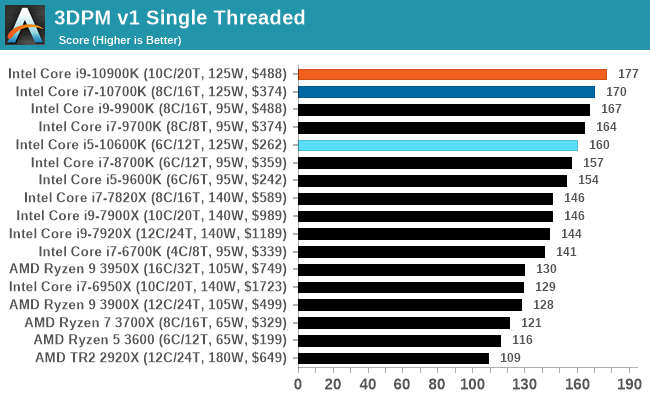
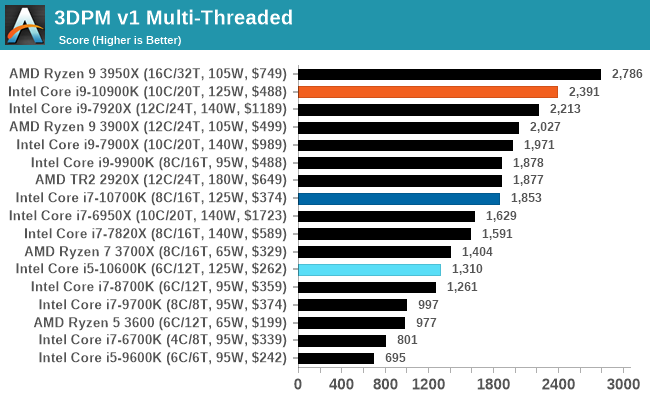
x264 HD 3.0: Older Transcode Test
This transcoding test is super old, and was used by Anand back in the day of Pentium 4 and Athlon II processors. Here a standardized 720p video is transcoded with a two-pass conversion, with the benchmark showing the frames-per-second of each pass. This benchmark is single-threaded, and between some micro-architectures we seem to actually hit an instructions-per-clock wall.
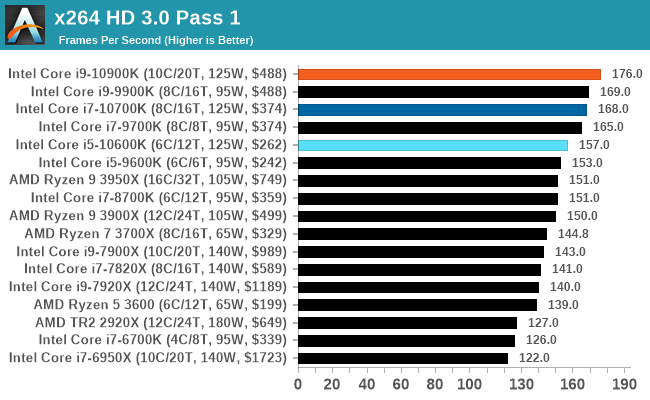
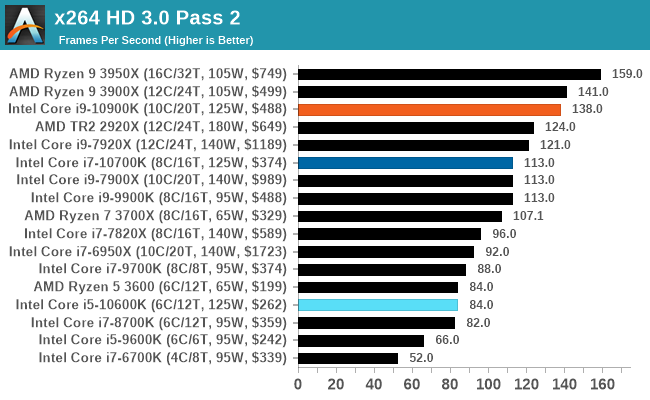










220 Comments
View All Comments
AnarchoPrimitiv - Wednesday, May 20, 2020 - link
Should I repost the countless comments made by Intel fanboys claiming that the fans on x570 meant the sky is falling? Don't try to ambush people with the accusation of a double standard when your side drew first bloodIrata - Wednesday, May 20, 2020 - link
The double standard was exactly my point. End of the world for X570 for own 50-60mm fan back then, Crickets chirping for several 40mm fans on Z490 now.Makaveli - Wednesday, May 20, 2020 - link
its one small fan and its inaudible I haven't heard mine ever. The only people complaining about this is people who still thinking they are dealing with motherboards from the 1990's.shing3232 - Thursday, May 21, 2020 - link
They're worrying about longevity of the fans.yeeeeman - Wednesday, May 20, 2020 - link
All x570 motherboards had fans that was the problem. Here some specific models doRSAUser - Thursday, May 21, 2020 - link
The above.I've tweaked the fan curve on my motherboards, it's never kicked in yet.
ryao - Wednesday, May 20, 2020 - link
Why are there data points from AMD missing in a number of tests. For example, the Crysis CPU render is missing data points for all of AMD’s processors except the 3600.schujj07 - Wednesday, May 20, 2020 - link
Crysis CPU render "This is one of our new benchmarks, so we are slowly building up the database as we start regression testing older processors."They are in the middle of updating the entire suite. That means that not every CPU has been tested with in the new suite so the only data available is from CPUs that have been tested.
gagegfg - Wednesday, May 20, 2020 - link
bad anandtech policy, thus confuse users. If they pay attention to the amount of unsubstantiated comments, they are targeted for those graphics, confusing users with "superiority of intel" ... and this is not the case
DannyH246 - Wednesday, May 20, 2020 - link
haha - yeah exactly. Anything where AMD would be ahead...."oh our database is light"